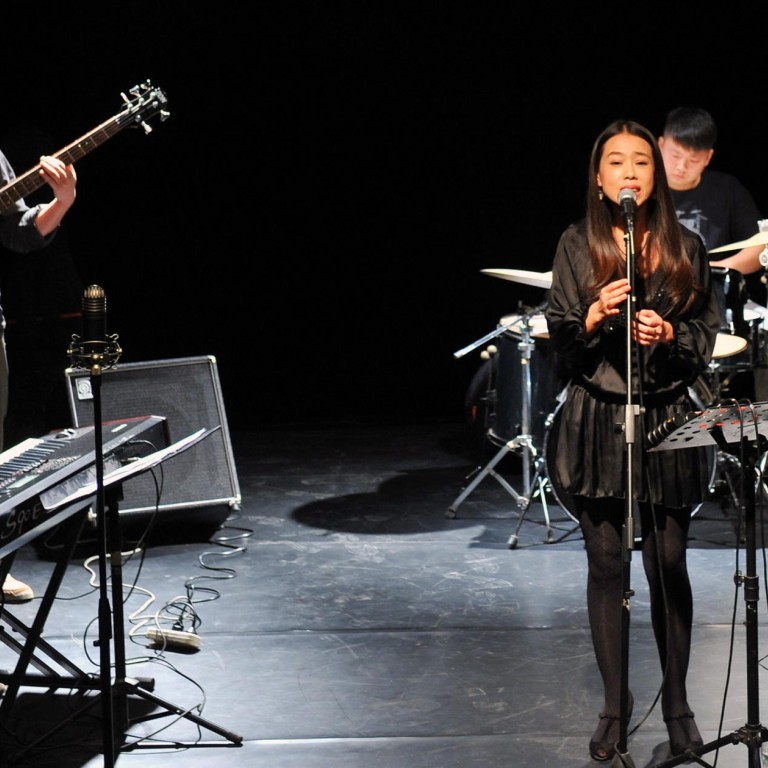
Jazz singer Zhan Xiaoli sets Chinese poetry and literary classics to music
Beijing singer discovered the genre 16 years ago and now strives to be an original voice at home
Zhan Xiaoli, 38, was a pop singer when she stumbled across a few CDs by artists she did not recognise in the stacks of foreign music at Yabaolu market in Beijing one day about 16 years ago. They were jazz recordings. She took them home and was captivated. Not long afterwards she took a leap of faith and moved to Vienna to study the genre. She furthered her knowledge with a stint in New York, but decided to return home to China and make a name for herself. In true jazz tradition, Zhan has created something original - setting the words of Chinese poetry and classical literature to jazz, as performed by her five-piece band. So far, she says her shows at the Penghao Theatre in Beijing have been well received.
I like writing songs and original music. I learned jazz singing when I was in Europe, but I thought I should come up with a new form of performance if I wanted my music to resonate with Chinese audiences. Jazz is not very well known by Chinese people, but they are familiar with Chinese poetry. As with classical literature, it is concise and succinct, which I like very much.
First of all, it has to move me. The pieces I have chosen carry messages that provide me with inspiration and make me think. I then think how to match the words with the right style of jazz, taking the aesthetic principles of Chinese poetry into account. Of the eight songs I am using in my performance, I like the two using modern poet Gu Cheng and Bei Dao's poetry as lyrics. The one using excerpts from the [ ] is also very meaningful to me. These writings are popular among Chinese people, but people will react differently when listening. That's interesting.
The feedback was better than I expected. As integrating Chinese poetry into jazz is new and there are not many jazz lovers in Beijing, it can be difficult to draw people to the show. Although the Penghao Theatre is a small venue, which can only accommodate a few dozen people, it has a reputation as a place for people who love artistic and original works. And because we use Chinese poetry as lyrics, it's easier for audiences to connect. They know the language, so when they listen to a song, they can form a picture in their minds. It's easier for them to accept this kind of performance. Jazz has a long history in the West, but there are just a few followers of the music in China. They are mainly people who lived overseas and have returned, and expats. For some audiences, they might have a preconception that jazz performances should be held in some gorgeous place. So to them, the way we present jazz might come across as weird.
I am happy this new attempt has received good feedback. I hope to issue an album collection of these songs and bring it to a wider audience. The theme of the album will be "when poetry meets jazz". I believe more people will be able to recognise our music when an album is available. I will continue to make more original music. This is very important to me. Recently, a friend posted a message on [the social-networking app] Weixin that I can't agree more with. It said tradition is a cornerstone but it's not just a holy thing for people to worship. So the best way to succeed is to innovate based on old experiences. If there is no creation, no innovation, why have we come into this world?
I was singing pop music when I first got to know jazz in 1997. I occasionally bought some CDs from roadside stalls at Yabaolu market. There were many foreign CDs of rock music and blues, but few jazz CDs. I bought what ones there were and listened. I didn't even know there was a genre called jazz, but I liked it very much and I thought it was my music. I was motivated to learn more and left China to study jazz singing in Vienna a couple of years later when I was 28. I found there was a lot I could learn. I went to clubs, bars and other venues to listen to more jazz music. I found that jazz could be very fruitful and there were different types of jazz that integrated the cultures of different countries. After spending 4½ years in Vienna, I went to New York. The 2½ months I spent in New York were remarkable. I found good jazz musicians everywhere, and they inspired me to keep learning. I returned to Beijing in 2008 and formed a band. Over the past five years, I have been insisting on creating something original, and I will keep on going.

